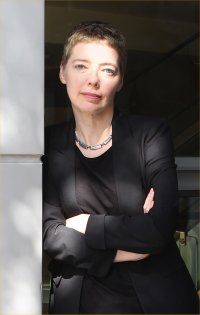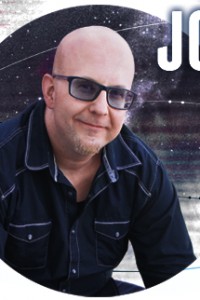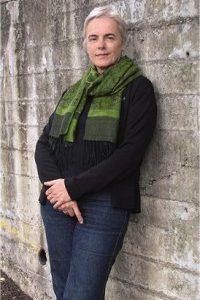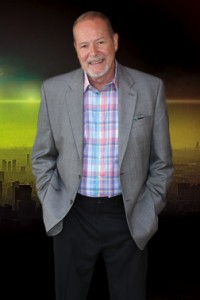Nicola Griffith: The Body & the World
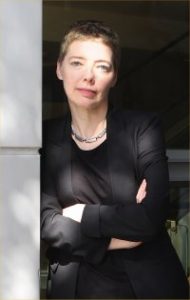 Nicola Jane Griffith was born September 30, 1960 in Leeds, Yorkshire, England. She went to college to study science but did not graduate, dropping out and moving to Hull, where she played in a band. She has also worked as a women’s self-defense instructor, and often teaches writing. She attended Clarion in 1988. At the workshop she met fellow writer Kelley Eskridge, and they were married in 1993, though the marriage wasn’t legally recognized at the time due to laws against same-sex unions. They were legally married in 2013, on the 20th anniversary of their original ceremony.
Nicola Jane Griffith was born September 30, 1960 in Leeds, Yorkshire, England. She went to college to study science but did not graduate, dropping out and moving to Hull, where she played in a band. She has also worked as a women’s self-defense instructor, and often teaches writing. She attended Clarion in 1988. At the workshop she met fellow writer Kelley Eskridge, and they were married in 1993, though the marriage wasn’t legally recognized at the time due to laws against same-sex unions. They were legally married in 2013, on the 20th anniversary of their original ceremony.
Griffith’s first story of SF interest was ‘‘An Other Winter’s Tale’’ in Network (1987), followed by ‘‘Mirrors and Burnstone’’ in Interzone (1988). Other notable stories include BSFA Award finalist and Tiptree Honor story ‘‘Touching Fire’’ (1993), Nebula Award nominee ‘‘Yaguara’’ (1995), and Hugo Award and Locus Award finalist ‘‘It Takes Two’’ (2009). Three of her stories were collected in With Her Body (2004).
Griffith’s debut novel Ammonite (1992) won the James Tiptree Jr. Memorial Award and a Lambda Literary Award, and was a finalist for the Arthur C. Clarke and British SF Association Awards. Slow River (1995) won a Nebula Award and another a Lambda Award. Literary crime novel The Blue Place (1998) began the Aud Torvingen series, which continued in Stay (2002) and Always (2007), all of which won awards. Her latest book Hild (2013) is a historical novel about Saint Hilda of Whitby, and was a Tiptree Honor Book, and finalist for the Nebula Award, John W. Campbell Memorial, Lambda Literary, and Bisexual Book Awards.
Griffith wrote a memoir, And Now We Are Going to Have a Party: Liner Notes to a Writer’s Early Life (2007), another Lambda winner, and edited three award-winning anthologies with Stephen Pagel: Bending the Landscape: Fantasy (1997), Bending the Landscape: Science Fiction (1998), and Bending the Landscape: Horror (2001).
Griffith and Eskridge live in Seattle WA.
‘‘I like to write about women who are the subject, not objects. I like to write about women who do rather than have done to them. They might do bad things – a lot of my women do bad things – but they do them because they seem like efficient ways to deal with what’s going on. I’m very much a creature of the body. In my books, physical violence is not cartoon violence; it’s about what the body does and how it works, and sometimes how good it feels to use the power of your body. I don’t see too many people being relaxed and enjoying their bodies in that way, in real life or books. Which reminds me of one of the very first panels I was ever on, at a Worldcon in 1989. It was about sex in fiction. What happened was that everyone on the panel except me was saying, ‘Sex is embarrassing, it’s messy, and people never talk about that in fiction and we should talk about that.’ For the whole panel I sat there smiling benignly thinking, ‘You must be doing it wrong.’
‘‘A lot of my work is about the body, and how we feel, and how the world works on our bodies and our bodies work on the world. Setting is my primary joy as a writer: the world and the body in it. I think story comes from that interface, where body meets world. Sort of the way some people think mind is born at the interface of world and brain. Whether you want to call it the problem, or the circumstance, or the situation, or the setup, the place a story begins is the world.”
…
 ‘‘Hild was real, St. Hilda of Whitby. She founded Whitby Abbey. It wasn’t called Whitby back in the day, it was something unpronounceable in old English, Streanæshalch. Bede translates it as ‘Bay of the Beacon’ – there used to be a Roman beacon there, apparently. The more I discovered about the abbey and its role in history, the Synod of Whitby and so forth, the more I thought, ‘Who was this woman? How did she do that?’ There were no books about her, no non-fiction, no novel, fucking nothing. I couldn’t find anything much about her. So I thought, ‘Okay, I’ll write an alternate history about the Synod of Whitby.’ The Synod of Whitby really did change the course of British history and therefore all our world history. I kept coming back to this woman, though. The more I found out about the meeting that she facilitated and basically hosted, presided over, the more important I realized that was. I thought, ‘Fuck it, I’m going to have to write a book about her.’”
‘‘Hild was real, St. Hilda of Whitby. She founded Whitby Abbey. It wasn’t called Whitby back in the day, it was something unpronounceable in old English, Streanæshalch. Bede translates it as ‘Bay of the Beacon’ – there used to be a Roman beacon there, apparently. The more I discovered about the abbey and its role in history, the Synod of Whitby and so forth, the more I thought, ‘Who was this woman? How did she do that?’ There were no books about her, no non-fiction, no novel, fucking nothing. I couldn’t find anything much about her. So I thought, ‘Okay, I’ll write an alternate history about the Synod of Whitby.’ The Synod of Whitby really did change the course of British history and therefore all our world history. I kept coming back to this woman, though. The more I found out about the meeting that she facilitated and basically hosted, presided over, the more important I realized that was. I thought, ‘Fuck it, I’m going to have to write a book about her.’”
…
“All religion is political. One’s belief is not necessarily political, but religion is. Religion is a group thing, people moving and acting, and so it has to be orchestrated. That’s politics. So all my priests, priestesses, seers, they operate politically. They have to. They’re all spin-meisters. That’s basically Hild’s job: she’s a political spin-meister. She’s really good at predicting the future because she watches how the world is, what direction people might move in when something happens. She can make well-informed guesses. Today I suppose it’s someone like Nate Silver with the blog Five Thirty Eight, who called all the election stuff, and did it by crunching the numbers. Essentially, that’s what Hild does. Instead of raw numbers she uses bits of information she pieces together from all over the place. A lot of it is such second nature to her, so instinctive – the way expertise always is – that she’s not always sure where she got the information. She sees this flight of birds and so she knows the weather must have been bad over there for them to be flocking here. She puts that together with a report she had from a spy about the crops somewhere else. She puts it all together and says, ‘Yep, there’s going to be war in about three months.’ In fact, she deliberately uses the notion of magic, people’s belief in it. She knows that to get what she wants, the results she needs, she has to use the tools at hand.”
…
‘‘I’m already working on the second book. I think there are going to be three volumes. Right now the plan is for them to fall neatly into the three parts of her life. So we have Hild until she’s 18 or 19. And then Hild from that age until she reappears in the historical record when she’s 32. The last book will be all about her life in the church and her official, recorded-as-history politics. Originally, though, this was meant to be all one book. But I got to 100,000 words and Hild was only 12, and I thought, ‘Well, that’s not going to work.’ So I’m hesitant about saying for sure. But I’m not going to go delta. I’m not going to spread the story thinner and thinner and wider and wider until it’s this vast shallow lake that doesn’t go anywhere. I’m going to keep it deep and fast-moving and cut right through the story until the end. I know what the last line is….”
…
‘‘I think science fiction is changing. Again. There’s definitely fresh air sweeping in. I like it. It’s not a bunch of white men sitting around eating white bread and talking about Leave it to Beaver anymore. The clubhouse doors are open. Science fiction no longer belongs to the same people. Who does it belong to now? Science fiction, the culture, the genre, the marketing label, whatever, was created and it can be uncreated. It can be changed. I think that’s what’s happening. Look at the ballot for the Nebula Award. Eight novels and at least two of them are not science fiction or fantasy in any accepted sense. And there are six women out of eight. The next ten years are going to be incredibly interesting. When William Gibson was inducted into the Science Fiction Hall of Fame, he said something which really resonated with me: ‘I’m a native of science fiction but no longer a resident.’ Science fiction is the first stuff I wrote as an adult. I’m a native, it’s my native language, I just don’t always live there. I’m of it, but I’m a citizen of the whole literary world. Just as I’m no longer just a UK citizen, I’m a dual US/UK citizen, I feel like science fiction is one of my identities, and not my only one. We’re all more than one thing.’’
Read the complete interview, and biographical profile, in the September 2014 issue of Locus Magazine. Photo by Francesca Myman.


